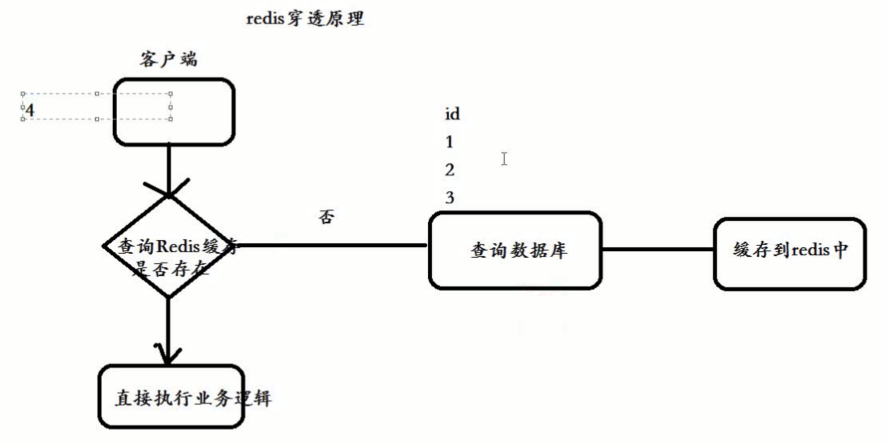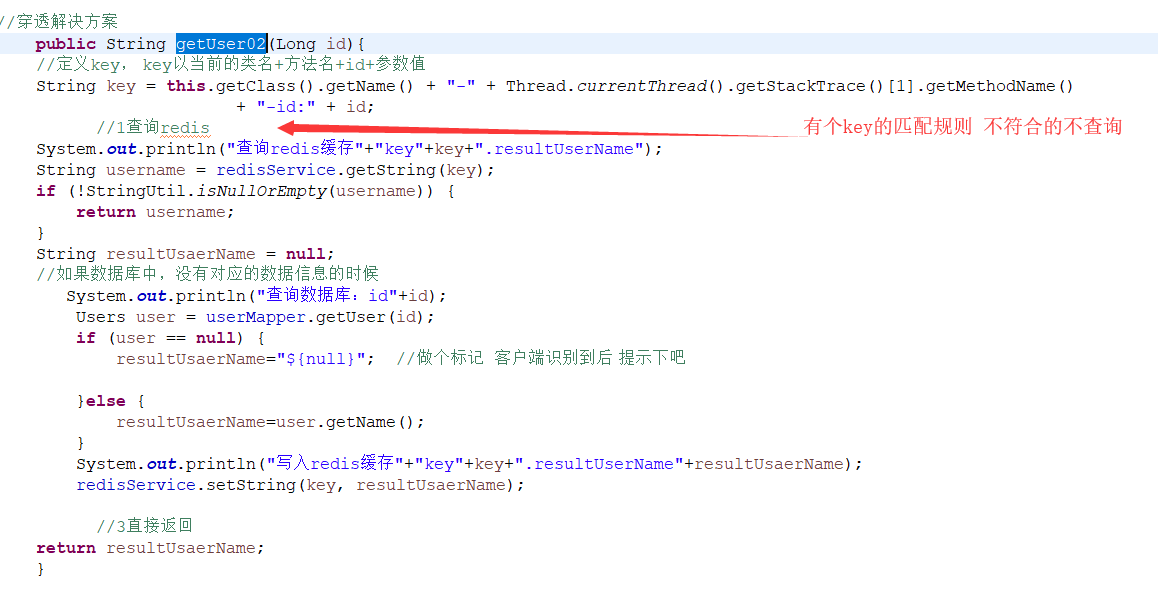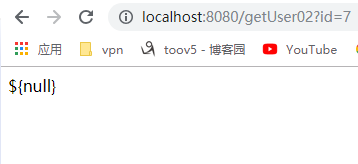缓存穿透
缓存穿透是指用户查询数据,在数据库没有,自然在缓存中也不会有。这样就导致用户查询的时候,在缓存中找不到,每次都要去数据库再查询一遍,然后返回空。这样请求就绕过缓存直接查数据库,这也是经常提的缓存命中率问题。
解决的办法就是:如果查询数据库也为空,直接设置一个默认值存放到缓存,这样第二次到缓冲中获取就有值了,而不会继续访问数据库,这种办法最简单粗暴。
把空结果,也给缓存起来,这样下次同样的请求就可以直接返回空了,即可以避免当查询的值为空时引起的缓存穿透。同时也可以单独设置个缓存区域存储空值,对要查询的key进行预先校验,然后再放行给后面的正常缓存处理逻辑。
查询查不到的数据,在缓存中没有,而直接走了数据库! 反反复复的去这么做就崩溃了哦

4没有,redis中没有,然后去DB查询,会导致雪崩效应。称之为 穿透效应。
穿透 产生的原因:客户端随机生成不同的key,在redis缓存中没有该数据,数据库也没有该数据。这样的话可能导致一直发生jdbc连接
解决方案:
1、通过网关判断客户端传入对应key的规则,不符合数据库查询规则,直接返回空
2、如果使用的key数据库查询不到的话,直接在redis中存一份null结果。
在存入id为4的数据库的时候,直接清除对应redis为4的缓存(此时是空哈)
废话不多说,上代码:
pom:
<project xmlns="http://maven.apache.org/POM/4.0.0" xmlns:xsi="http://www.w3.org/2001/XMLSchema-instance" xsi:schemaLocation="http://maven.apache.org/POM/4.0.0 http://maven.apache.org/xsd/maven-4.0.0.xsd">
<modelVersion>4.0.0</modelVersion>
<groupId>com.toov5.architect</groupId>
<artifactId>architect</artifactId>
<version>0.0.1-SNAPSHOT</version>
<parent>
<groupId>org.springframework.boot</groupId>
<artifactId>spring-boot-starter-parent</artifactId>
<version>2.0.0.RELEASE</version>
</parent>
<dependencies>
<!-- SpringBoot 对lombok 支持 -->
<dependency>
<groupId>org.projectlombok</groupId>
<artifactId>lombok</artifactId>
</dependency>
<!-- SpringBoot web 核心组件 -->
<dependency>
<groupId>org.springframework.boot</groupId>
<artifactId>spring-boot-starter-web</artifactId>
</dependency>
<dependency>
<groupId>org.springframework.boot</groupId>
<artifactId>spring-boot-starter-tomcat</artifactId>
</dependency>
<!-- SpringBoot 外部tomcat支持 -->
<dependency>
<groupId>org.apache.tomcat.embed</groupId>
<artifactId>tomcat-embed-jasper</artifactId>
</dependency>
<!-- springboot-log4j -->
<dependency>
<groupId>org.springframework.boot</groupId>
<artifactId>spring-boot-starter-log4j</artifactId>
<version>1.3.8.RELEASE</version>
</dependency>
<!-- springboot-aop 技术 -->
<dependency>
<groupId>org.springframework.boot</groupId>
<artifactId>spring-boot-starter-aop</artifactId>
</dependency>
<!-- https://mvnrepository.com/artifact/commons-lang/commons-lang -->
<dependency>
<groupId>commons-lang</groupId>
<artifactId>commons-lang</artifactId>
<version>2.6</version>
</dependency>
<!-- https://mvnrepository.com/artifact/org.apache.httpcomponents/httpclient -->
<dependency>
<groupId>org.apache.httpcomponents</groupId>
<artifactId>httpclient</artifactId>
</dependency>
<!-- https://mvnrepository.com/artifact/com.alibaba/fastjson -->
<dependency>
<groupId>com.alibaba</groupId>
<artifactId>fastjson</artifactId>
<version>1.2.47</version>
</dependency>
<dependency>
<groupId>javax.servlet</groupId>
<artifactId>jstl</artifactId>
</dependency>
<dependency>
<groupId>taglibs</groupId>
<artifactId>standard</artifactId>
<version>1.1.2</version>
</dependency>
<!--开启 cache 缓存 -->
<dependency>
<groupId>org.springframework.boot</groupId>
<artifactId>spring-boot-starter-cache</artifactId>
</dependency>
<!-- ehcache缓存 -->
<dependency>
<groupId>net.sf.ehcache</groupId>
<artifactId>ehcache</artifactId>
<version>2.9.1</version><!--$NO-MVN-MAN-VER$ -->
</dependency>
<dependency>
<groupId>org.mybatis.spring.boot</groupId>
<artifactId>mybatis-spring-boot-starter</artifactId>
<version>1.1.1</version>
</dependency>
<!-- mysql 依赖 -->
<dependency>
<groupId>mysql</groupId>
<artifactId>mysql-connector-java</artifactId>
</dependency>
<!-- redis 依赖 -->
<dependency>
<groupId>org.springframework.boot</groupId>
<artifactId>spring-boot-starter-data-redis</artifactId>
</dependency>
</dependencies>
</project>
service:
package com.toov5.service; import org.springframework.beans.factory.annotation.Autowired; import org.springframework.cache.ehcache.EhCacheCacheManager; import org.springframework.stereotype.Component; import net.sf.ehcache.Cache; import net.sf.ehcache.Element; @Component public class EhCacheUtils { // @Autowired // private CacheManager cacheManager; @Autowired private EhCacheCacheManager ehCacheCacheManager; // 添加本地缓存 (相同的key 会直接覆盖) public void put(String cacheName, String key, Object value) { Cache cache = ehCacheCacheManager.getCacheManager().getCache(cacheName); Element element = new Element(key, value); cache.put(element); } // 获取本地缓存 public Object get(String cacheName, String key) { Cache cache = ehCacheCacheManager.getCacheManager().getCache(cacheName); Element element = cache.get(key); return element == null ? null : element.getObjectValue(); } public void remove(String cacheName, String key) { Cache cache = ehCacheCacheManager.getCacheManager().getCache(cacheName); cache.remove(key); } }
package com.toov5.service; import java.util.Set; import java.util.concurrent.TimeUnit; import org.springframework.beans.factory.annotation.Autowired; import org.springframework.data.redis.core.StringRedisTemplate; import org.springframework.stereotype.Component; @Component public class RedisService { @Autowired private StringRedisTemplate stringRedisTemplate; //这样该方法支持多种数据类型 public void set(String key , Object object, Long time){ //开启事务权限 stringRedisTemplate.setEnableTransactionSupport(true); try { //开启事务 stringRedisTemplate.multi(); String argString =(String)object; //强转下 stringRedisTemplate.opsForValue().set(key, argString); //成功就提交 stringRedisTemplate.exec(); } catch (Exception e) { //失败了就回滚 stringRedisTemplate.discard(); } if (object instanceof String ) { //判断下是String类型不 String argString =(String)object; //强转下 //存放String类型的 stringRedisTemplate.opsForValue().set(key, argString); } //如果存放Set类型 if (object instanceof Set) { Set<String> valueSet =(Set<String>)object; for(String string:valueSet){ stringRedisTemplate.opsForSet().add(key, string); //此处点击下源码看下 第二个参数可以放好多 } } //设置有效期 if (time != null) { stringRedisTemplate.expire(key, time, TimeUnit.SECONDS); } } //做个封装 public void setString(String key, Object object){ String argString =(String)object; //强转下 //存放String类型的 stringRedisTemplate.opsForValue().set(key, argString); } public void setSet(String key, Object object){ Set<String> valueSet =(Set<String>)object; for(String string:valueSet){ stringRedisTemplate.opsForSet().add(key, string); //此处点击下源码看下 第二个参数可以放好多 } } public String getString(String key){ return stringRedisTemplate.opsForValue().get(key); } }
package com.toov5.service; import java.util.concurrent.locks.Lock; import java.util.concurrent.locks.ReentrantLock; import org.springframework.beans.factory.annotation.Autowired; import org.springframework.stereotype.Service; import org.springframework.web.bind.annotation.RequestMapping; import com.toov5.entity.Users; import com.toov5.mapper.UserMapper; import io.netty.util.internal.StringUtil; @Service public class SnowslideService { @Autowired private UserMapper userMapper; @Autowired private RedisService redisService; private Lock lock = new ReentrantLock(); public String getUser01(Long id){ //定义key, key以当前的类名+方法名+id+参数值 String key = this.getClass().getName() + "-" + Thread.currentThread().getStackTrace()[1].getMethodName() + "-id:" + id; //1查询redis String username = redisService.getString(key); if (!StringUtil.isNullOrEmpty(username)) { return username; } String resultUsaerName = null; try { //开启锁 lock.lock(); Users user = userMapper.getUser(id); if (username == null) { return null; } resultUsaerName =user.getName(); redisService.setString(key, resultUsaerName); } catch (Exception e) { // TODO: handle exception }finally { //释放锁 lock.unlock(); } //3直接返回 return resultUsaerName; } //穿透解决方案 public String getUser02(Long id){ //定义key, key以当前的类名+方法名+id+参数值 String key = this.getClass().getName() + "-" + Thread.currentThread().getStackTrace()[1].getMethodName() + "-id:" + id; //1查询redis System.out.println("查询redis缓存"+"key"+key+".resultUserName"); String username = redisService.getString(key); if (!StringUtil.isNullOrEmpty(username)) { return username; } String resultUsaerName = null; //如果数据库中,没有对应的数据信息的时候 System.out.println("查询数据库:id"+id); Users user = userMapper.getUser(id); if (user == null) { resultUsaerName="${null}"; //做个标记 客户端识别到后 提示下吧 }else { resultUsaerName=user.getName(); } System.out.println("写入redis缓存"+"key"+key+".resultUserName"+resultUsaerName); redisService.setString(key, resultUsaerName); //3直接返回 return resultUsaerName; } }
package com.toov5.service; import org.springframework.beans.factory.annotation.Autowired; import org.springframework.stereotype.Component; import com.alibaba.fastjson.JSONObject; import com.toov5.entity.Users; import com.toov5.mapper.UserMapper; import io.netty.util.internal.StringUtil; @Component public class UserService { @Autowired private EhCacheUtils ehCacheUtils; @Autowired private RedisService redisService; @Autowired private UserMapper userMapper; //定义个全局的cache名字 private String cachename ="userCache"; public Users getUser(Long id){ //先查询一级缓存 key以当前的类名+方法名+id+参数值 String key = this.getClass().getName() + "-" + Thread.currentThread().getStackTrace()[1].getMethodName() + "-id:" + id; //查询一级缓存数据有对应值的存在 如果有 返回 Users user = (Users)ehCacheUtils.get(cachename, key); if (user != null) { System.out.println("key"+key+",直接从一级缓存获取数据"+user.toString()); return user; } //一级缓存没有对应的值存在,接着查询二级缓存 // redis存对象的方式 json格式 然后反序列号 String userJson = redisService.getString(key); //如果rdis缓存中有这个对应的值,修改一级缓存 最下面的会有的 相同会覆盖的 if (!StringUtil.isNullOrEmpty(userJson)) { //有 转成json JSONObject jsonObject = new JSONObject();//用的fastjson Users resultUser = jsonObject.parseObject(userJson,Users.class); ehCacheUtils.put(cachename, key, resultUser); return resultUser; } //都没有 查询DB Users user1 = userMapper.getUser(id); if (user1 == null) { return null; } //保证两级缓存有效期相同!? 一级缓存时间-二级缓存执行的时间 //一级缓存时间 等于 二级缓存剩下的时间 //存放到二级缓存 redis中 redisService.setString(key, new JSONObject().toJSONString(user1)); //存放到一级缓存 Ehchache ehCacheUtils.put(cachename, key, user1); return user1; } }
mapper
package com.toov5.mapper; import java.util.List; import org.apache.ibatis.annotations.Param; import org.apache.ibatis.annotations.Select; import org.springframework.cache.annotation.CacheConfig; import org.springframework.cache.annotation.Cacheable; import com.toov5.entity.Users; //引入的jar包后就有了这个注解了 非常好用 (配置缓存的基本信息) @CacheConfig(cacheNames={"userCache"}) //缓存的名字 整个类的 public interface UserMapper { @Select("SELECT ID ,NAME,AGE FROM users where id=#{id}") @Cacheable //让这个方法实现缓存 查询完毕后 存入到缓存中 不是每个方法都需要缓存呀!save()就不用了吧 Users getUser(@Param("id") Long id); }
entity
package com.toov5.entity; import java.io.Serializable; import lombok.Data; @Data public class Users implements Serializable{ private String name; private Integer age; }
controller
package com.toov5.controller; import org.springframework.beans.factory.annotation.Autowired; import org.springframework.web.bind.annotation.RequestMapping; import org.springframework.web.bind.annotation.RestController; import com.toov5.service.SnowslideService; @RestController public class UserRedisController { @Autowired private SnowslideService snowslideService; @RequestMapping("/getUser02") public String getUser02(Long id){ return snowslideService.getUser02(id); } }
package com.toov5.controller; import org.springframework.beans.factory.annotation.Autowired; import org.springframework.web.bind.annotation.RequestMapping; import org.springframework.web.bind.annotation.RestController; import com.toov5.entity.Users; import com.toov5.service.UserService; @RestController public class IndexController { @Autowired private UserService userService; @RequestMapping("/userId") public Users getUserId(Long id){ return userService.getUser(id); } }
启动类
package com.toov5.app; import org.mybatis.spring.annotation.MapperScan; import org.springframework.boot.SpringApplication; import org.springframework.boot.autoconfigure.SpringBootApplication; import org.springframework.cache.annotation.EnableCaching; @EnableCaching //开启缓存 @MapperScan(basePackages={"com.toov5.mapper"}) @SpringBootApplication(scanBasePackages={"com.toov5.*"}) public class app { public static void main(String[] args) { SpringApplication.run(app.class, args); } }
yml
###端口号配置
server:
port: 8080
###数据库配置
spring:
datasource:
url: jdbc:mysql://localhost:3306/test
username: root
password: root
driver-class-name: com.mysql.jdbc.Driver
test-while-idle: true
test-on-borrow: true
validation-query: SELECT 1 FROM DUAL
time-between-eviction-runs-millis: 300000
min-evictable-idle-time-millis: 1800000
# 缓存配置读取
cache:
type: ehcache
ehcache:
config: classpath:app1_ehcache.xml
redis:
database: 0
jedis:
pool:
max-active: 8
max-wait: -1
max-idle: 8
min-idle: 0
timeout: 10000
cluster:
nodes:
- 192.168.91.5:9001
- 192.168.91.5:9002
- 192.168.91.5:9003
- 192.168.91.5:9004
- 192.168.91.5:9005
- 192.168.91.5:9006
<?xml version="1.0" encoding="UTF-8"?>
<ehcache xmlns:xsi="http://www.w3.org/2001/XMLSchema-instance"
xsi:noNamespaceSchemaLocation="http://ehcache.org/ehcache.xsd">
<diskStore path="java.io.tmpdir/ehcache-rmi-4000" />
<!-- 默认缓存 -->
<defaultCache maxElementsInMemory="1000" eternal="true"
timeToIdleSeconds="120" timeToLiveSeconds="120" overflowToDisk="true"
diskSpoolBufferSizeMB="30" maxElementsOnDisk="10000000"
diskPersistent="true" diskExpiryThreadIntervalSeconds="120"
memoryStoreEvictionPolicy="LRU">
</defaultCache>
<!-- demo缓存 --><!-- name="userCache" 对应我们在 @CacheConfig(cacheNames={"userCache"}) !!!!! -->
<!--Ehcache底层也是用Map集合实现的 -->
<cache name="userCache" maxElementsInMemory="1000" eternal="false"
timeToIdleSeconds="120" timeToLiveSeconds="120" overflowToDisk="true"
diskSpoolBufferSizeMB="30" maxElementsOnDisk="10000000"
diskPersistent="false" diskExpiryThreadIntervalSeconds="120"
memoryStoreEvictionPolicy="LRU"> <!-- LRU缓存策略 -->
<cacheEventListenerFactory
class="net.sf.ehcache.distribution.RMICacheReplicatorFactory" />
<!-- 用于在初始化缓存,以及自动设置 -->
<bootstrapCacheLoaderFactory
class="net.sf.ehcache.distribution.RMIBootstrapCacheLoaderFactory" />
</cache>
</ehcache>
再加一个拦截

运行结果:


把空结果,也给缓存起来,这样下次同样的请求就可以直接返回空了,即可以避免当查询的值为空时引起的缓存穿透。同时也可以单独设置个缓存区域存储空值,对要查询的key进行预先校验,然后再放行给后面的正常缓存处理逻辑。
注意:再给对应的ip存放真值的时候,需要先清除对应的之前的空缓存。
补充热点key
热点key:某个key访问非常频繁,当key失效的时候有打量线程来构建缓存,导致负载增加,系统崩溃。
解决办法:
①使用锁,单机用synchronized,lock等,分布式用分布式锁。
②缓存过期时间不设置,而是设置在key对应的value里。如果检测到存的时间超过过期时间则异步更新缓存。
③在value设置一个比过期时间t0小的过期时间值t1,当t1过期的时候,延长t1并做更新缓存操作。